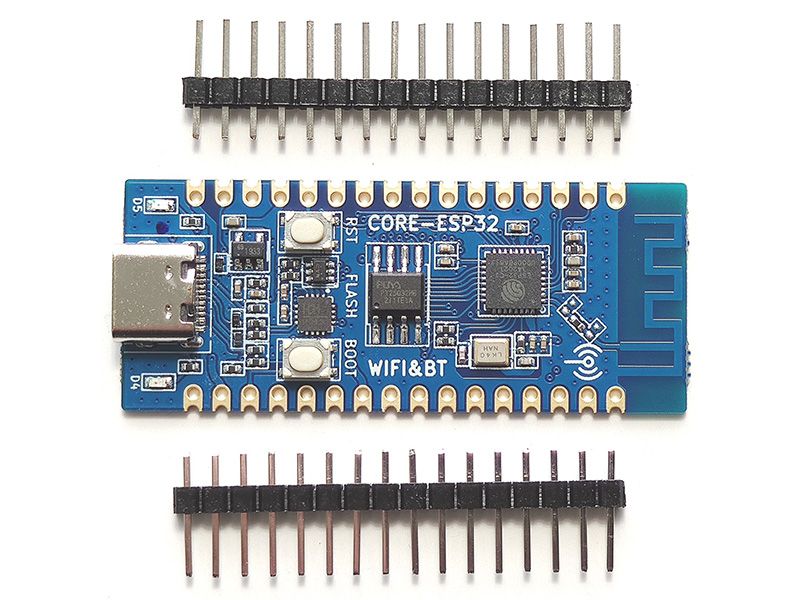
Luatos ESP32-C3 Core Board – CH343 USB UART by Luatos
The LuatOS ESP32-C3 core board is a type of development board based on the ESP32-C3 chip, which is a highly integrated Wi-Fi and Bluetooth system-on-chip (SoC) designed for low-power Internet of Things (IoT) applications.
The LuatOS ESP32-C3 core board is designed to help developers prototype and develop their IoT projects quickly and easily. It includes a variety of hardware features, such as a USB Type-C and CH343 USB-UART for power and programming.
The board is also equipped with LuatOS, which is an open-source operating system that provides a high-level API for developers to interact with the board’s hardware and peripherals. LuatOS is based on the Lua programming language, which is known for its simplicity and ease of use, making it a popular choice among developers.
Overall, the LuatOS ESP32-C3 core board Development Board is a powerful and versatile development tool that enables developers to quickly prototype and develop their IoT projects using the ESP32-C3 chip and LuatOS operating system.
Features
- Based on the ESP32-C3 WIFI & Bluetooth LE RISC-V Single-Core CPU
- Type-C USB
- Castellated pads
- 4MB Flash
- Clock speed: 160 Mhz
- 15x Digital IO
- ADC(5 channel, 12-bit), I2C, SPI, UARTx2
- Size: 21mm x 51mm
- Default firmware: LuatOS
- 2 red status LEDs
Note
There are 2 versions of this board, differing in the inclusion of a CH343 UART to USB component. This board definition targets the version with the CH343 which connects to the USB-C connector.
Purchase
Contribute
Have some info to add for this board? Edit the source for this page here.
CircuitPython 10.0.3
This is the latest stable release of CircuitPython that will work with the Luatos ESP32-C3 Core Board – CH343 USB UART. Use this release if you are new to CircuitPython.
Modules included in this download
_asyncio _bleio _bleio (native) _eve _pixelmap adafruit_bus_device adafruit_pixelbuf aesio alarm analogbufio analogio array atexit audiobusio audiocore audiomixer audiomp3 binascii bitbangio bitmapfilter bitmaptools board builtins builtins.pow3 busdisplay busio busio.SPI busio.UART canio codeop collections digitalio displayio epaperdisplay errno espidf espnow fontio fourwire framebufferio getpass gifio hashlib i2cdisplaybus io ipaddress jpegio json keypad keypad.KeyMatrix keypad.Keys keypad.ShiftRegisterKeys keypad_demux keypad_demux.DemuxKeyMatrix locale lvfontio math max3421e mdns microcontroller msgpack neopixel_write nvm onewireio os os.getenv ps2io pulseio pwmio rainbowio random re rgbmatrix rtc sdcardio select sharpdisplay socketpool socketpool.socketpool.AF_INET6 ssl storage struct supervisor synthio sys terminalio tilepalettemapper time touchio traceback ulab usb vectorio warnings watchdog wifi zlibFeatures: Wi-Fi, USB-C, Bluetooth/BTLE, Breadboard-Friendly, Castellated Pads
CircuitPython 10.1.0-rc.1
This is the latest development release of CircuitPython that will work with the Luatos ESP32-C3 Core Board – CH343 USB UART.
Alpha development releases are early releases. They are unfinished, are likely to have bugs, and the features they provide may change. Beta releases may have some bugs and unfinished features, but should be suitable for many uses. A Release Candidate (rc) release is considered done and will become the next stable release, assuming no further issues are found.
Please try alpha, beta, and rc releases if you are able. Your testing is invaluable: it helps us uncover and find issues quickly.
Modules included in this download
_asyncio _bleio _bleio (native) _eve _pixelmap adafruit_bus_device adafruit_pixelbuf aesio alarm analogbufio analogio array atexit audiobusio audiocore audiomixer audiomp3 binascii bitbangio bitmapfilter bitmaptools board builtins builtins.pow3 busdisplay busio busio.SPI busio.UART canio codeop collections digitalio displayio epaperdisplay errno espidf espnow fontio fourwire framebufferio getpass gifio hashlib i2cdisplaybus io ipaddress jpegio json keypad keypad.KeyMatrix keypad.Keys keypad.ShiftRegisterKeys keypad_demux keypad_demux.DemuxKeyMatrix locale lvfontio math max3421e mdns microcontroller msgpack neopixel_write nvm onewireio os os.getenv ps2io pulseio pwmio rainbowio random re rgbmatrix rtc sdcardio select sharpdisplay socketpool socketpool.socketpool.AF_INET6 ssl storage struct supervisor synthio sys terminalio tilepalettemapper time touchio traceback ulab usb vectorio warnings watchdog wifi zlibFeatures: Wi-Fi, USB-C, Bluetooth/BTLE, Breadboard-Friendly, Castellated Pads
Absolute Newest
Every time we commit new code to CircuitPython we automatically build binaries for each board and language. The binaries are stored on Amazon S3, organized by board, and then by language. These releases are even newer than the development release listed above. Try them if you want the absolute latest and are feeling daring or want to see if a problem has been fixed.
Previous Versions of CircuitPython
All previous releases of CircuitPython are available for download from Amazon S3 through the button below. For very old releases, look in the OLD/ folder for each board. Release notes for each release are available at GitHub button below.
Older releases are useful for testing if you something appears to be broken in a newer release but used to work, or if you have older code that depends on features only available in an older release. Otherwise we recommend using the latest stable release.
